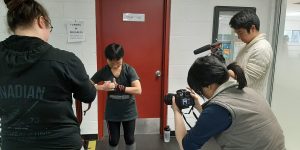The ability for archivists and curators to decide what has enduring value to whom is what makes archives political. How such materials are collected or made accessible are what make archives ethically contentious. What happens, then, when marginalized communities get to create and curate their own archives? ACAM 350 (formerly FIPR 469a) “Asian Canadian Community-Based Media” focuses on both documentary and narrative film production. My research questions as I took this course were the following: How might the films made through ACAM 350 be read as an archive? Why is the experience of building this archive pedagogically important, and how does centering the process of narrative production factor into this? In this essay, I explore how the process of producing materials in a community archive helps students to engage archives more critically. I do this by comparing my own layered autoethnographic narrative and account of the experience with the impacts of other community projects. Using an archival framework, I interpret the growth I’ve experienced in producing a film for ACAM 350 as it relates to how students and academia can grow from community-based projects rooted in collaborative knowledge production.
Read the paper here: Producing the Record

Ultimately I learned about being flexible, thinking critically, and letting go when needed.
This directed studies began as a Student Directed Seminar, but I couldn't garner enough interest among my peers to run the course. Adapting to the situation and taking on suggestions from my supervisor and SDS support staff, I decided to make it an directed study so I could still do independent research on a topic I cared a lot about. I very much thought of this paper and this course as a sort of capstone project for myself, merging and culminating all that I had learned in my undergraduate career from various disciplines. This project really showed me how capable I was--as well as how much I had grown--from an academic standpoint.
I learned a lot about my own creating and learning process while doing this, but I know that if I had more time and resources, I'd like to interview my peers and past and future students about their experiences. I'd like to learn more about their thoughts on this process, and on the idea that producing video for a course is the creation of an archive. I would have liked to learn more from professors and educators about their perspective of the pedagogical values I saw in the course I was analyzing.
I definitely think if I were to go into a similar project again (e.g. for a thesis in graduate studies), I would go in with a better sense of what I want to write and narrow the topic further. I ended up reading many articles that were unrelated or that had to be cut because I didn't end up covering the topics I had researched. This lead to a tighter timeline that I'd like. I think that I would also set up a word-count based check-in with my supervisor throughout the process, because I found myself quite behind near the end because I had spent so much time reading materials I did not use.